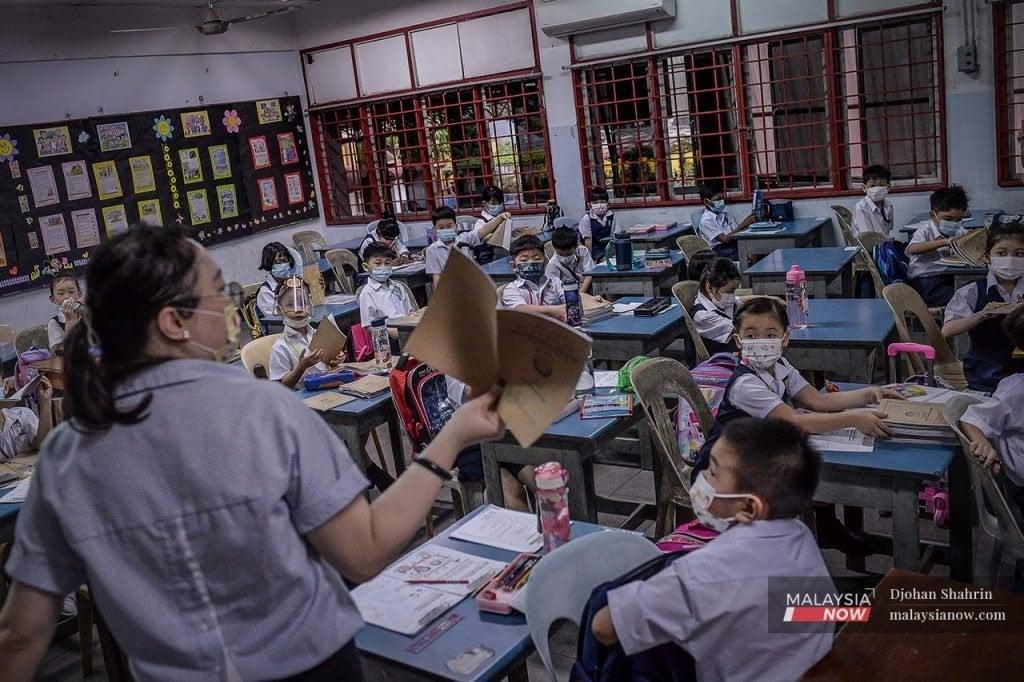Now what, educationists ask as UPSR exits the scene after 30 years
They say the education ministry must provide clear communication to address the concerns raised by parents and teachers about the way forward without the Standard Six exam.
Just In
Experts have called for clear communication by the government on its plans for school-based assessments to replace the Standard Six Primary School Achievement Test or UPSR, amid a survey by an education group revealing concerns among parents over the direction of their children’s academic development now that the exam has been scrapped.
Charis Ding, from Persatuan Literasi Anak Malaysia or MYReaders, said the education ministry has a bigger role to play now in ensuring the transmission of information to mitigate any potential risks highlighted by parents and teachers.
“These concerns include the risk that students will no longer have clear learning goals, that the quality of teaching and learning will be compromised without UPSR results as a key performance indicator, or that school-based assessments will not be effectively carried out and that parents will not have a gauge of their children’s progress,” she told MalaysiaNow.
The survey carried out by MYReaders from May 11 to 27 involved 772 participants comprising parents and teachers from all states in the country. The responses included 594 from parents who had one or more children currently enrolled in public primary schools.
A total of 403 disagreed with the move to scrap UPSR while 253 agreed and 116 were neutral or had mixed feelings.
For over 30 years, UPSR was the main method of assessing primary school students in four key areas: reading, writing, counting and reasoning.
Of the 403 who disagreed, 49% said UPSR was an important indicator of their children’s academic achievements. Many voiced concern that they would now lack a benchmark for their children’s learning developments after six years in primary school.
Some said there would be “no transparent gauge to measure children’s achievements in learning” while others expressed fear that school-based assessments would be biased.
Another 23% said without UPSR, children would lose their motivation to study.
For over 30 years, UPSR was the main method of assessing primary school students in four key areas: reading, writing, counting and reasoning.
Critics however said the assessment had led to an obsession for achieving high grades, with huge amounts of effort and resources poured into ensuring that students bring home good results each year.
Early childhood practitioner Putri Afzan Maria Zulkifli who welcomed the move to scrap the exam described it as a “much-needed revolution in the Malaysian education system”.
She said it would allow the implementation of a holistic approach to preparing children for the challenges they would face in the workplace.
She suggested various approaches to assessing student development without the exam including increasing observation and decreasing the subjects involved, and implementing thematic or project-based assessments that integrate multiple subjects in one lesson.
“Accountability between schools, teachers and parents needs to go beyond once-a-year parent-teacher conferences or report card days.”
“Observe the students’ strengths according to multiple intelligence,” she added. “Focus on an individualised education plan.”
However, she acknowledged the risks of allowing schools the autonomy to assess students without UPSR, saying accountability and trust will be key.
“I believe that parents can rest assured about school-based assessments if their relationship with the school and teachers is well established. The trust will be there.”
Ding agreed, saying frequent communication will be needed between parents and teachers.
“Parents need opportunities to be kept in the loop on their child’s progress and what they can do as parents to support their child’s learning throughout the school year.
“This accountability between schools, teachers and parents needs to go beyond once-a-year parent-teacher conferences or report card days,” she said.
She added that measures should be taken to support teachers, schools and parents and to ensure that students receive the support they need.
She urged the education ministry to equip and empower teachers to carry out meaningful school-based assessments for the evaluation of students based on learning standards and milestones throughout the academic year.
But she dismissed the notion that scrapping UPSR would affect children’s literacy skills, saying a lack of early and regular screening for low literary as well as mechanisms for immediate early intervention are more to blame for this problem.
Putri meanwhile encouraged parents to adopt a more holistic approach to evaluating their children’s development.
“How would you know that a child is fully developed physically, mentally, emotionally and socially by assessing only through academic-based assessment?
“We need to look into the purpose of this exam. What is it really for? Are you sure it is for parents to see what their children have learned so far?”
Subscribe to our newsletter
To be updated with all the latest news and analyses daily.
